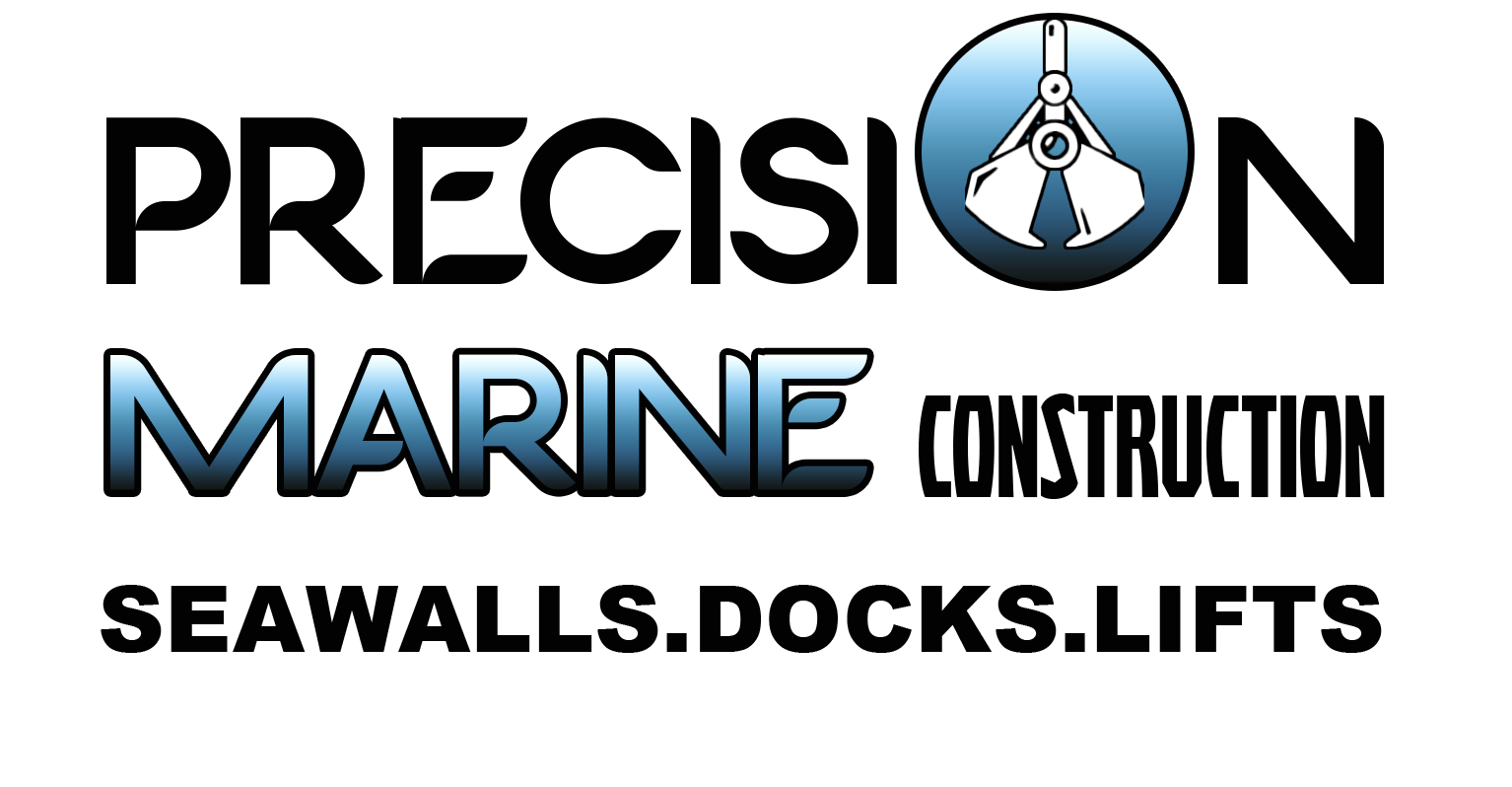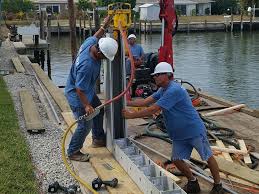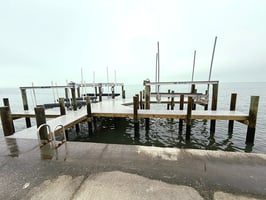The construction of seawalls is an excellent way to protect your property from the dangers of sea...
The Ultimate Guide to Installing a Vinyl Seawall
 Seawalls protect coastal property from destructive water and waves, preventing erosion and the loss of valuable land. They are a great investment that helps preserve property value and home safety. Before installing a seawall, here are some essential details to know.
Seawalls protect coastal property from destructive water and waves, preventing erosion and the loss of valuable land. They are a great investment that helps preserve property value and home safety. Before installing a seawall, here are some essential details to know.
Introduction to Seawalls and Their Importance
Seawalls are structures built to protect properties from the effects of waves, tides, and water. They help prevent erosion, flooding, and other damage caused by water. Seawalls have been used for centuries and are a common sight in coastal areas.
They are an essential investment for anyone who lives on or near the water. Without a seawall, your property is vulnerable to the destructive force of water.
Different Types of Seawall Materials
There are several materials used in the construction of seawalls. The most common materials are concrete, metal, wood, and vinyl. Each material has pros and cons, and the choice depends on several factors, such as location, budget, and personal preference.
Concrete Seawall
- Concrete seawalls are one of the most popular choices for seawall construction. They are durable, long-lasting, and require minimal maintenance. Concrete seawalls can withstand the force of waves and water, making them an excellent choice for high-risk areas. They also provide a solid foundation for other structures, such as docks and boat lifts.
- However, concrete seawalls are expensive to install and may not be suitable for all locations. They require a lot of labor, materials, and equipment, which can add to the cost. Concrete seawalls are also prone to cracking and erosion, compromising their effectiveness.
Metal Corrugated Seawall
- Metal corrugated seawalls, such as steel and aluminum, are another popular choice for seawall construction. Metal seawalls can withstand the force of waves and water, making them an excellent choice for high-risk areas. They also provide a sleek and modern look to any property.
- However, metal seawalls are prone to rust and corrosion, compromising their effectiveness. They also require regular maintenance, such as painting and coating, to prevent rust and corrosion.
Wood Seawall
- Wood seawalls are a traditional choice for seawall construction. They provide a natural and rustic look to any property. Wood seawalls are also easy to install and can be customized to fit any property. They are also relatively inexpensive compared to other materials.
- However, wood seawalls are prone to rot, decay, and insect infestation, which can compromise their effectiveness. They also require regular maintenance, such as staining and sealing, to prevent rot and decay.
Advantages of Using a Vinyl Seawall over Other Materials
Vinyl seawalls are becoming a popular choice for seawall construction. They offer several advantages over other materials, such as concrete, metal, and wood. Here are some of the benefits of using a vinyl seawall:
Durability
- Vinyl seawalls are incredibly durable and can withstand the force of waves and water. They are made of high-quality vinyl materials resistant to decay, rot, and insect infestation. Vinyl seawalls are also resistant to cracking, splitting, and erosion, which can compromise their effectiveness.
Low Maintenance
- Vinyl seawalls require minimal maintenance compared to other materials. They don't require painting, staining, or sealing, which can save you time and money.
Economical
- Vinyl seawalls are relatively inexpensive compared to other materials. They require less labor, materials, and equipment, saving you money. Vinyl seawalls are also easy to install and can be customized to fit any property.
Environmentally friendly
- Vinyl seawalls are environmentally friendly and don't harm marine life. They are made of non-toxic materials that are safe for the environment. Vinyl seawalls also won't leach chemicals or pollutants into the water, which can harm marine life.
Choosing the Right Vinyl Seawall Contractor - Introduction to Precision Marine Construction (PMC)
Choosing the right vinyl seawall contractor is crucial for a successful installation process. Precision Marine Construction (PMC) is a reputable and experienced vinyl seawall contractor specializing in construction and repair. PMC offers various services, including seawall design, installation, and maintenance.
PMC has a team of highly skilled and experienced professionals who are dedicated to providing exceptional service. They use high-quality materials and advanced equipment to ensure the seawall's durability and effectiveness.
Steps Involved in Vinyl Seawall Installation by PMC
PMC follows a detailed installation process to ensure the seawall's effectiveness and durability. Here are the steps involved in vinyl seawall installation by PMC:
- Site inspection and assessment
PMC conducts a site inspection and assessment to determine the seawall's specifications and requirements. - Design and planning
PMC creates a seawall design and plan that meets the property's needs and requirements. - Permitting
PMC obtains the necessary permits and approvals from local authorities before installation. - Installation
PMC installs the seawall using high-quality vinyl sheet pilings and interlocking systems. They also secure the seawall with tiebacks or deadmen for additional support. - Backfilling
PMC backfills the area behind the seawall with soil or other materials to provide additional support. - Maintenance of Vinyl Seawalls
Maintaining a vinyl seawall is relatively easy and requires minimal effort. Here are some maintenance tips to ensure the seawall's effectiveness and durability: - Regular inspection
Regular inspection of the seawall is necessary to detect any damage or decay. This involves checking for cracks, splits, or erosion. - Cleaning Cleaning the seawall regularly is necessary to remove any debris or marine growth. This involves washing the seawall with a hose or pressure washer.
- Repair
Repairing any damage or decay is necessary to ensure the seawall's effectiveness. This involves filling any cracks or splits with vinyl sealant. - Comparison of Vinyl Seawalls with Other Seawall Materials
Vinyl seawalls offer several advantages over other seawall materials, such as concrete, metal, and wood. Here's a comparison of vinyl seawalls with other seawall materials: - Durability
Vinyl seawalls are more durable than wood and metal seawalls. They are resistant to decay, rot, and insect infestation, which can compromise the effectiveness of wood and metal seawalls. - Low maintenance
Vinyl seawalls require minimal maintenance compared to concrete and wood seawalls. They don't require painting, staining, or sealing, which can save you time and money. - Economical
Vinyl seawalls are relatively inexpensive compared to concrete and metal seawalls. They require less labor, materials, and equipment, saving you money. - Environmentally friendly
Vinyl seawalls are environmentally friendly and don't harm marine life. They are made of non-toxic materials that are safe for the environment.
Which Seawall Material Is the Best Choice for You and Your Property?
A seawall is a crucial investment that helps protect your property from the damaging effects of waves and water. Vinyl seawalls offer several advantages over other seawall materials, such as durability, low maintenance, economical, and environmental friendliness.
Precision Marine Construction (PMC) is a reputable and experienced vinyl seawall contractor specializing in construction and repair. Choosing the right seawall material depends on several factors, such as location, budget, and personal preference. We hope this guide has provided you with the information you need to make an informed decision about your seawall investment.




Blog comments